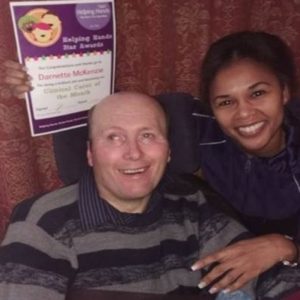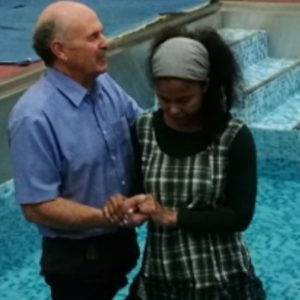David is from Devon and lives with the rare recessive condition called Friedreich’s ataxia. After receiving ongoing support from his family for many years, particularly from his mother, David’s sister recognised that it was time for some extra help and started looking at the options for live-in care.
Living with Friedreich’s ataxia

In the UK, Friedreich’s ataxia affects around one in 50,000 people. As the most common form of ataxia, the nervous system is progressively damaged, which can affect muscle coordination and the spinal cord, with some cases also leading to diabetes and heart complications.
Whereas some forms of ataxia can be caused by head injuries, such as those endured through a car accident, other forms, like Friedreich’s, are inherited.
The symptoms of Friedreich’s ataxia usually develop before the age of 25, though it’s not unheard of for symptoms to develop later in life.
David, who’s now in his fifties, has particularly struggled with hearing and vision, and needs assistance in moving safely around the home. His family help him to keep a familiar routine and support him with day-to-day tasks.
Recognising the time for extra support
It was David’s sister, Sarah, who recognised in 2016 that the family needed extra help to help with her brother’s growing support needs. Up to this point, David, had mainly been supported by his mother Marion, with extra assistance when it was needed from private carers.
Despite initial resistance from the family, Sarah persuaded them to explore the support of live-in help. Following a lengthy – and challenging – process to secure the right funding, David’s family found Helping Hands.
Jennifer Robbins is a Clinical Nurse Specialist at Helping Hands and met with David and his family back in 2016 to see what type of support they were looking for and the type of carer that would suit them most. A registered nurse, Jennifer manages home care packages in the South West of England, bringing her clinical expertise to enabling people to live safe and independently in the comfort of their homes.
“A vital part of David’s care was his family,” Jennifer explains. “It was also important that they felt they could trust the carer and, immediately, I thought of Darnette. She’s a wonderful person, inside and out.”
A carer match made in heaven
Originally from Spain, Darnette first joined Helping Hands in 2015 with a simple desire to help people in need. Before coming to support David and his family as a live-in carer, she cared for people living with advanced dementia and those recovering from strokes, always bringing a loving and compassionate approach to her work.
Darnette’s enthusiasm and passion for supporting others made her a good choice for David and his family. She helps David with all aspects of his care, and also fits in well with the rest of the family and the other visiting carers – she’s a true team player.
Speaking with warmth and compassion, Darnette says “Working with David’s family is like a dream come true. I really love everyone here. A big thank you to Jennifer for giving me a placement like this!”
A shared love of religion
With live-in care, it’s important that both the carer and the person receiving care have some common interests – something that they can both experience together during the early stages. For David and Darnette, it’s religion.

Religion plays a key part in both their lives. Darnette helps David to attend his church and reads scriptures to him. Having someone like Darnette who shares his beliefs has enabled the two of them to share some wonderful moments.
One such moment came when Darnette herself was baptised at David’s church – a truly special occasion for everyone. With David and his family present, Darnette was welcomed, quite literally, with open arms into the family and into the church community.
Does your family need extra support?
If you or a loved one is caring for someone with a progressive condition, it can be difficult admitting when extra support is needed, especially when there are concerns over what options are available.
Speaking to a specialist in home care, and even meeting face-to-face, will help you and your family to see what possibilities are available and whether live-in care will work for you. For a free home care consultation, get in touch with our team on 0808 274 7734.
